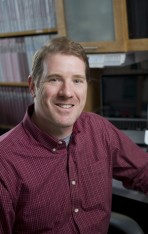2013 Metcalf Award Recipient: John R. Finnerty
 John Finnerty is Associate Professor in the Department of Biology in the College of Arts & Sciences. His interdisciplinary research centers on biodiversity and the impact of various environmental stressors over time on marine invertebrates.
John Finnerty is Associate Professor in the Department of Biology in the College of Arts & Sciences. His interdisciplinary research centers on biodiversity and the impact of various environmental stressors over time on marine invertebrates.
Over the course of his 14 years at BU, Professor Finnerty’s infectiously interactive classroom style has immersed students in the full scientific process, from forming hypotheses to producing “scientific deliverables” for society at large. He pursues a singular philosophy: to teach students how to be scientists with commitment to intellectual honesty and lifelong curiosity about the world around them.
Professor Finnerty’s nominators describe him as “without question, one of our most dedicated and effective teachers in both the classroom and laboratory,” and cite his efforts in the development of new courses and pedagogy, the integration of teaching and research activities, and the mentorship of undergraduate and graduate students in original research. To engage students in the process of discovery, he even devised his own interactive laboratory manuals.
Students who enter Professor Finnerty’s classes and labs in Marine Science, Evolution & Development, and Biodiversity are asked to approach scientific inquiry through multiple disciplines, often incorporating genomics, genetics, molecular biology, developmental biology, and ecology, among others. Professor Finnerty regularly threads his own research into lectures and exercises, challenging students to think critically and contribute to discussion. Well-rounded researchers are the result – 21st-century scientists able to consider multiple perspectives in answering some of biology’s most vexing questions.
Professor Finnerty earned his B.A. in Biology from the University of Pennsylvania and holds a Ph.D. in Organismal Biology from the University of Chicago, where he completed his postdoctoral work in Evolutionary Developmental Biology. He is the author of dozens of widely cited papers and journal publications and has been awarded numerous grants from the National Science Foundation.
